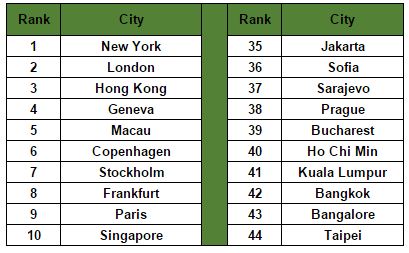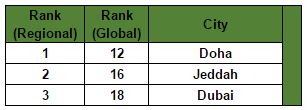GCC markets benefit from access to low-cost labor and energy, according to the Arcadis International Construction Cost Index
Middle East: The major cities of the Middle East - Doha and Dubai - remain some of the least expensive cities in the world in which to build, according to the International Construction Costs Index published by Arcadis, the leading global Design & Consultancy firm for natural and built assets.
Regionally, Doha is the most expensive city for construction in the Middle East, followed by Jeddah and Dubai, respectively.
The index, which analyzes the relative cost of construction across 44 major cities, finds that the local labor markets and resource availability have positively benefitted cities in the GCC. The findings also underline the impact of strong currency performance and the fall in the price of oil in the Middle East.
Ian Williamson, Buildings Global Business Leader at Arcadis in the Middle East, said: "Throughout 2015, the global construction market saw the overall level of cost inflation restricted due to the drops in commodity prices. Particularly when it comes to oil, growing uncertainty over prices will inevitably have a short to medium term impact on the GCC construction industry. The region's major commercial centers of Doha and Dubai remain - for the time being, at least - relatively stable locations for developers, benefitting from access to inexpensive labor and energy."
In the Gulf region, Doha's position as a major world city will progress quickly over the next decade whilst Dubai remains a major regional hub.
Over the next ten years in Doha, US$ 150 billion is expected to be spent on the like of roads, railways, stadiums and ports, as well as hospitality and social infrastructure. Moreover, the country has plans for further investment in transport infrastructure, water and electricity by 2020. Likewise, the Dubai airport surpassed London Heathrow as the busiest airport in the world and is becoming a major global destination. This together with Dubai Expo 2020, is expected to bring major economic benefits.
Williamson comments: "As we enter 2016, it is fair to say that we have another challenging year in prospect for the construction industry. With the steep fall in the price of oil, the timing of investment programs across the Middle East has become uncertain. Declining commodity prices, low labor rates and a highly competitive Middle East construction market have given rise to more potential opportunities across newly-affordable markets. It is a good time for government, funders and developers to capitalize on their investment ambitions."
The findings provide an average price bracket for 13 different type of building in each location, including residential, commercial and public sector developments. The index is based on construction costs only and excludes land and finance. Costs are calculated based on estimates made by Arcadis cost management experts around the world and take into account the likes of currency values, commodity prices, local labor markets and resource availability.
The most and least expensive cities for construction according to the index are:
The GCC city construction cost rankings according to the index are:
The full report can be downloaded here from www.arcadis.com/ICC2016
-Ends-
About the study
The comparative cost assessment is based on a survey of construction costs in 44 locations undertaken by Arcadis, covering 13 building types. Costs are representative of the local specification used to meet market need. The building solutions adopted in each location are broadly similar and as a result, the cost differential reported represents differences in specification as well as the cost of labor and materials - rather than significant differences in building function.
Costs in local currencies have been converted into a common currency for the purpose of the comparison, but no account has been taken of purchase power parity. High and low cost factors for each building type have been calculated relative to the UK, where average costs for south east England = 100, using US dollar as the currency unit. The relative costs plotted in the chart represent the average high and low cost factor for each of the 13 buildings included in the sample. Construction costs are current in Q2 2015. Exchange rates were current in October 2015.
About Arcadis
Arcadis is the leading global Design & Consultancy firm for natural and built assets. Applying our deep market sector insights and collective design, consultancy, engineering, project and management services we work in partnership with our clients to deliver exceptional and sustainable outcomes throughout the lifecycle of their natural and built assets. We are 28,000 people active in over 70 countries that generate more than €3 billion in revenues. We support UN-Habitat with knowledge and expertise to improve the quality of life in rapidly growing cities around the world. www.arcadis.com. Arcadis. Improving quality of life.
For further press information please contact:
Julie Nguyen, Public Relations Manager at Arcadis
+971 (0)56 188 2465 / Julie.nguyen@arcadis.com
© Press Release 2016





















